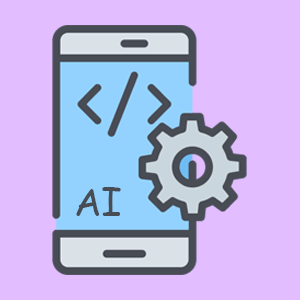 In the dynamic realm of technology, Artificial Intelligence (AI) is reshaping mobile app development in profound ways. This comprehensive exploration delves into the intricate interplay between AI and app development, unraveling its transformative influence on design, functionality, development workflows, and security. Beyond a mere trend, the integration of AI signifies a seismic shift, offering practical solutions to longstanding challenges and shaping the trajectory of the industry. Developers navigating this digital frontier are not just adapting to trends but actively leveraging AI as a strategic imperative, propelling the evolution of mobile applications. This article invites readers to join a journey where AI is not merely a tool but a dynamic force redefining the very fabric of mobile app innovation, where possibilities are limitless, and the landscape is continually evolving.
In the dynamic realm of technology, Artificial Intelligence (AI) is reshaping mobile app development in profound ways. This comprehensive exploration delves into the intricate interplay between AI and app development, unraveling its transformative influence on design, functionality, development workflows, and security. Beyond a mere trend, the integration of AI signifies a seismic shift, offering practical solutions to longstanding challenges and shaping the trajectory of the industry. Developers navigating this digital frontier are not just adapting to trends but actively leveraging AI as a strategic imperative, propelling the evolution of mobile applications. This article invites readers to join a journey where AI is not merely a tool but a dynamic force redefining the very fabric of mobile app innovation, where possibilities are limitless, and the landscape is continually evolving.
Design Innovation with AI
- User-Centric Design Insights: AI has ushered in a new era for mobile app designers by offering unprecedented insights into user behavior. Machine learning algorithms analyze vast datasets of user interactions, enabling designers to make informed decisions about user interfaces. Tools like Adobe’s Sensei leverage AI to automate repetitive design tasks, allowing designers to focus on more creative aspects while ensuring that user interfaces align seamlessly with user preferences.
- Generative Design: AI-driven design tools, exemplified by Runway ML, take creativity to new heights. These tools employ generative models to create design elements, patterns, and even entire layouts based on predefined parameters. This not only accelerates the design process but also introduces an element of unpredictability, fostering innovative and unique app aesthetics.
Functional Enhancements through AI
- Natural Language Processing (NLP): AI-powered functionalities are transforming how users interact with mobile apps. NLP enables apps to understand and respond to user input in a more natural and context-aware manner. Voice-activated virtual assistants, powered by NLP algorithms, provide users with personalized recommendations and responses, enhancing the overall user experience.
- Real-time Adaptability: Machine learning algorithms enable mobile apps to adapt in real-time based on user behavior. Whether it’s personalized content recommendations or dynamic UI adjustments, AI ensures that the app evolves with the user, creating a more engaging and user-centric experience.
Streamlined Development Workflows
- Automated Code Generation: AI has brought about a revolution in code development with tools like OpenAI’s Codex. By leveraging machine learning models trained on extensive code repositories, these tools can generate functional code snippets based on natural language descriptions. This not only accelerates the development process but also reduces the likelihood of coding errors.
- AI-driven Testing: Ensuring the reliability of mobile apps is paramount, and AI has stepped in to enhance the testing process. Automated testing tools powered by AI can simulate user interactions, identify potential bugs, and even suggest fixes. This not only speeds up the testing phase but also improves the overall quality of the developed app.
Security Reinforcement through AI
- Behavioral Analysis: With the increasing complexity of mobile app ecosystems, AI plays a crucial role in fortifying security. Behavioral analysis, powered by machine learning algorithms, distinguishes between normal and potentially malicious activities. This proactive approach to security ensures that app developers can stay one step ahead of evolving cyber threats.
- Adaptive Threat Detection: Traditional security measures are often reactive, responding to known threats. AI, however, introduces adaptive threat detection that can learn and evolve to recognize new and emerging threats. This dynamic approach is vital in the ongoing battle against cyber threats.
Helpful AI Tools in Mobile App Development
- TensorFlow: An open-source machine learning framework, TensorFlow empowers developers to integrate sophisticated AI capabilities into their mobile apps, including image recognition, language processing, and predictive analytics.
- Dialogflow: Developed by Google, Dialogflow simplifies the integration of conversational interfaces and chatbots into mobile apps, enhancing user engagement through natural and interactive conversations.
- Firebase ML Kit: Firebase ML Kit offers a comprehensive set of pre-trained machine learning models that streamline the integration of machine learning capabilities into mobile apps. Developers can effortlessly incorporate features like text recognition, image labeling, and face detection.
- Clarifai: Specializing in visual recognition, Clarifai provides an easy-to-use API for developers to integrate powerful image and video analysis capabilities into their mobile apps, opening up new possibilities for creative and interactive functionalities.
Conclusion
As the mobile app development landscape evolves, embracing the transformative power of Artificial Intelligence becomes not only a strategic imperative but a key differentiator. From enhancing design aesthetics and functionalities to streamlining development workflows and reinforcing security measures, AI is the catalyst driving innovation in the industry. As developers continue to leverage AI tools and methodologies, the future promises even more intelligent, intuitive, and secure mobile applications that will redefine user experiences across the digital landscape. Embracing AI is not merely a choice; it is a journey towards staying at the forefront of the dynamic and competitive mobile app development industry.
